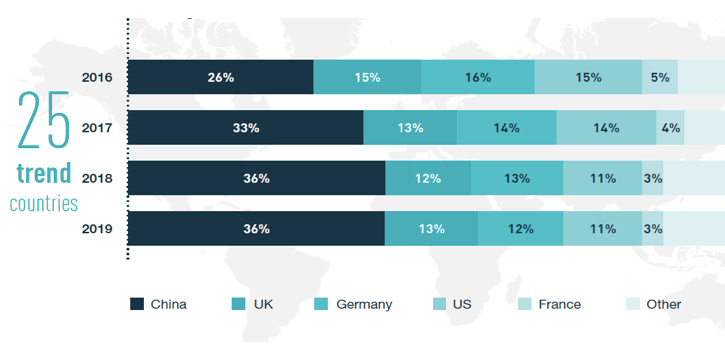The International Post Corporation (IPC) has released the findings of its Cross-Border E-commerce Shopper Survey 2019, which reveal that an increasing number of consumers are demanding more sustainable delivery options.
According to the survey, 66% of global consumers strongly agreed or agreed that they would like the packaging of their parcels to be recyclable and expressed a strong preference to receive parcels in cardboard rather than plastic. Furthermore, 45% of cross-border online shoppers would like the delivery process to be carbon-neutral.
The 2019 survey, its fifth edition, was extended to reach over 35,700 consumers in 41 different countries across North and South America, Asia-Pacific and Europe.
Holger Winklbauer, CEO of IPC, said, “Over the five editions of the Cross-Border E-commerce Shopper Survey we have continuously increased the geographical scope and sample. As 25 countries have participated in all five editions of the research, we have been able to report on five-year trends in this year’s report.
“We also explored consumers’ views on sustainability when shopping online cross-border. This has highlighted the importance to consumers in providing recyclable packaging and sustainable delivery. This aligns very well with the efforts the postal sector has been making in the field of sustainability and supports the new direction of our sustainability program through alignment to the wider UN Sustainable Development Goals.”
IPC’s analysis of respondents’ answers shows that of the parcels bought cross-border in 2019, 39% were purchased from China, 14% from the USA, 10% from the UK and 9% from Germany.
Respondents who had made a purchase from China in the past year were asked what they would do if online purchases from China increased by €10 (US$11) per item. This new question was asked in anticipation of European Union changes to VAT and customs legislation for low-cost items coming from China, and also to reflect possible higher postal delivery costs for future Chinese purchases. Thirty-six percent of these respondents said they would stop buying from China altogether, 41% would buy slightly less from China, and 13% would have no change to their purchase activity.
The 2019 survey measured consumer satisfaction with six key elements: delivery cost, delivery location, tracking, delivery speed, customs and returns. Of these six elements, delivery speed had the lowest level of consumer satisfaction. This was the case in almost all 41 surveyed markets. The most common delivery speed for cross-border purchases was 15-29 days (20%), with 11% of respondents having to wait 30 days or more for their purchase to arrive.
To download the key findings from the research go to www.ipc.be/shopper


